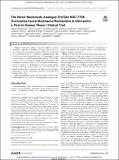The novel nucleoside analogue ProTide NUC-7738 overcomes cancer resistance mechanisms in vitro and in a first-in-human Phase 1 clinical trial
Abstract
Purpose: Nucleoside analogues form the backbone of many therapeutic regimens in oncology and require the presence of intracellular enzymes for their activation. A ProTide is comprised of a nucleoside fused to a protective phosphoramidate cap. ProTides are easily incorporated into cells whereupon the cap is cleaved and a pre-activated nucleoside released. 3'-deoxyadenosine (3'-dA) is a naturally-occurring adenosine analogue with established anti-cancer activity in vitro but limited bioavailability due to its rapid in vivo deamination by the circulating enzyme adenosine deaminase, poor uptake into cells and reliance on adenosine kinase for its activation. In order to overcome these limitations, 3'-dA was chemically modified to create the novel ProTide NUC-7738. Experimental Design: We describe the synthesis of NUC-7738. We determine the IC50 of NUC-7738 using pharmacokinetics (PK) and conduct genome-wide analyses to identify its mechanism of action using different cancer model systems. We validate these findings in cancer patients. Results: We show that NUC-7738 overcomes the cancer resistance mechanisms that limit the activity of 3'-dA and that its activation is dependent on ProTide cleavage by the enzyme histidine triad nucleotide binding protein 1. PK and tumour samples obtained from the ongoing first-in-human Phase 1 clinical trial of NUC-7738 further validate our in vitro findings and show NUC-7738 is an effective pro-apoptotic agent in cancer cells with effects on the NF-kappaB pathway. Conclusions: Our study provides proof that NUC-7738 overcomes cellular resistance mechanisms and support its further clinical evaluation as a novel cancer treatment within the growing pantheon of anti-cancer ProTides.
Citation
Schwenzer , H , De Zan , E , Elshani , M , van Stiphout , R , Kudsy , M , Morris , J , Ferrari , V , Um , I H , Chettle , J , Kazmi , F , Campo , L , Easton , A , Nijman , S , Serpi , M , Symeonides , S , Plummer , R , Harrison , D J , Bond , G & Blagden , S P 2021 , ' The novel nucleoside analogue ProTide NUC-7738 overcomes cancer resistance mechanisms in vitro and in a first-in-human Phase 1 clinical trial ' , Clinical Cancer Research , vol. Early . https://doi.org/10.1158/1078-0432.CCR-21-1652
Publication
Clinical Cancer Research
Status
Peer reviewed
ISSN
1078-0432Type
Journal article
Description
We thank the Oxford Genomics Centre at the Wellcome Centre for Human Genetics (funded by Wellcome Trust grant reference 203141/Z/16/Z) for the generation and initial processing of the sequencing data. This work was funded in part by NuCana plc. The Oxford Early Phase Clinical Trials Unit, the Edinburgh and Newcastle Trials units are grateful for support from CRUK and Experimental Cancer Medicine Centre (ECMC) funding.Collections
Items in the St Andrews Research Repository are protected by copyright, with all rights reserved, unless otherwise indicated.

